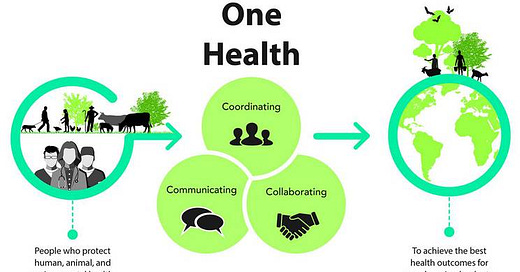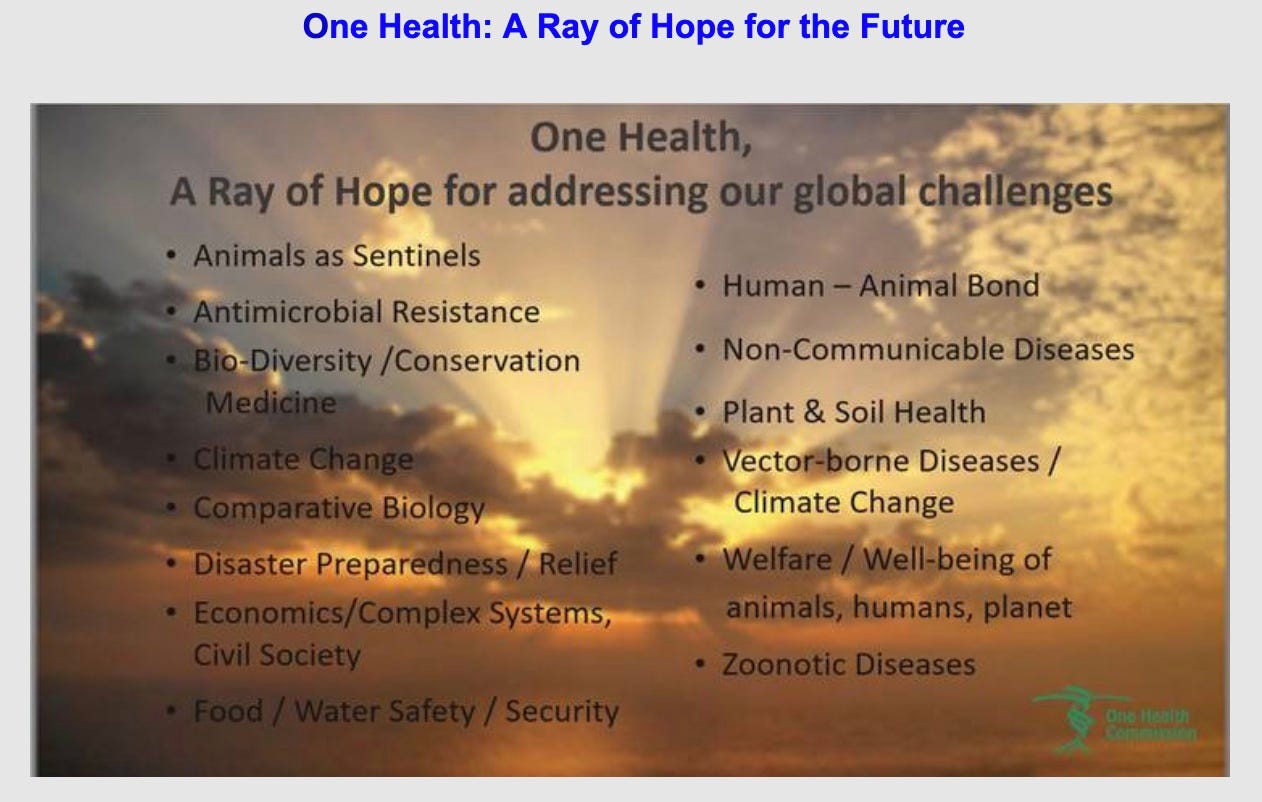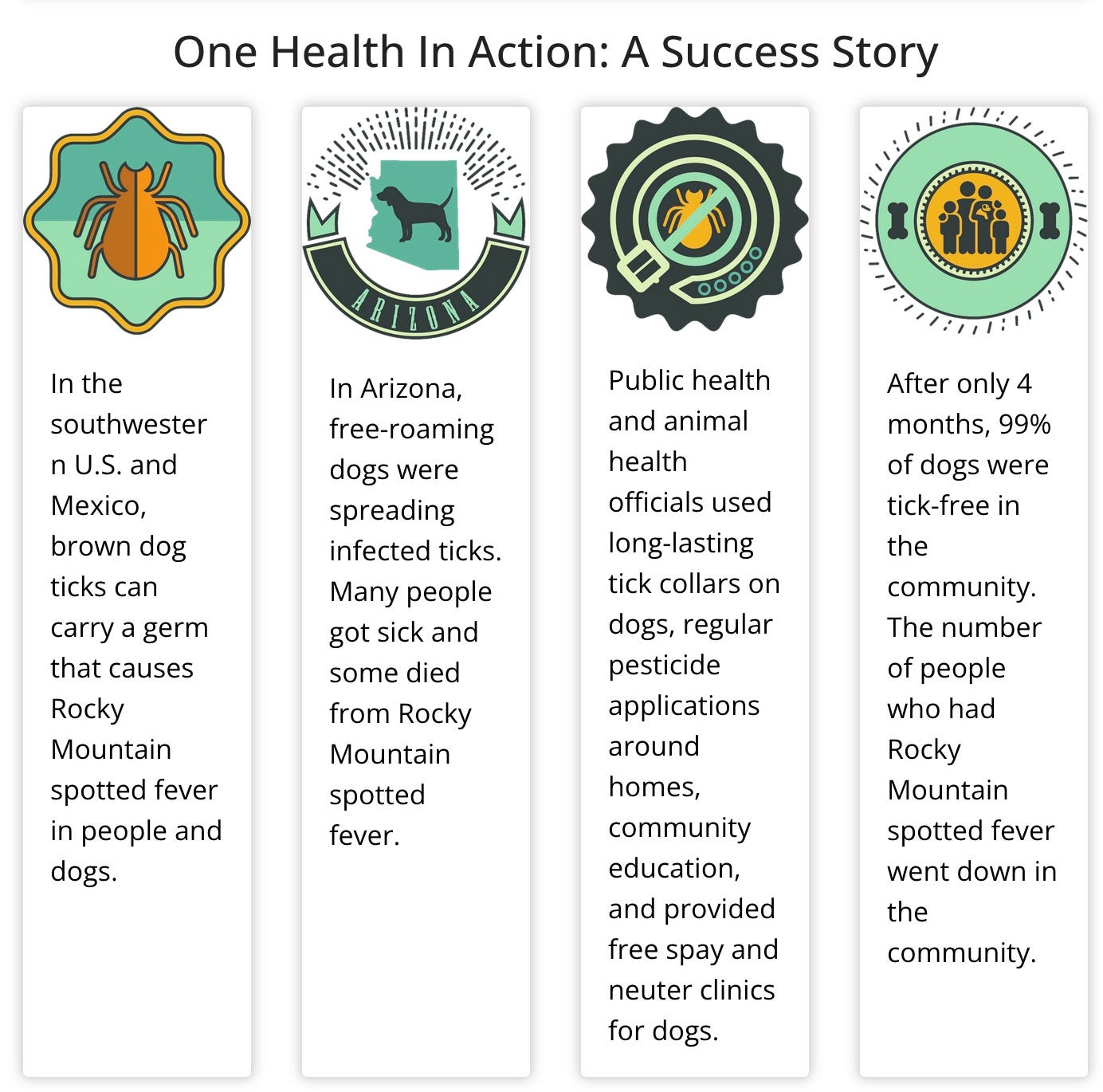What is One Health?--check out what the One Health Commission has to say about it
It's everything and nothing--but it lassos everything in the world and puts a noose around our necks. And compliance is baked into the 2023 NDAA.
What is the definition of One Health? Well, apparently there were 60 different definitions so the One Health High Level Expert Panel came up with a final definition. [Not just ordinary experts but high level experts were needed to craft a definition that could be used to gain sovereignty over everything.] We examine who these high level experts are at the end of this substack. Their One Health definition:
One Health is an integrated, unifying approach that aims to sustainably balance and optimize the health of people, animals and ecosystems. It recognizes the health of humans, domestic and wild animals, plants, and the wider environment (including ecosystems) are closely linked and inter-dependent.
The approach mobilizes multiple sectors, disciplines and communities at varying levels of society to work together to foster well-being and tackle threats to health and ecosystems, while addressing the collective need for clean water, energy and air, safe and nutritious food, taking action on climate changes and contributing to sustainable development. [I guess that means they will tackle the changing climate whether it heats up or cools down?]
https://www.onehealthcommission.org/en/why_one_health/what_is_one_health/
Scope of One Health
Some people misunderstand and think that One Health is about everything therefore if must be about nothing. But the truth is that One Health thinking (see definition above) and implementation is needed in so many arenas [???] that it just seems to be about 'everything'.
Because of the inextricable interconnectedness of animal, environmental, human, plant and planet health, here are a few areas that urgently need the One Health approach, at all levels of academia, government, industry, policy and research:
Agricultural production and land use
Animals as Sentinels for Environmental agent and contaminants detection and response
Antimicrobial resistance mitigation
Biodiversity / Conservation Medicine
Climate change and impacts of climate on health of animals, ecosystems, and humans
Clinical medicine needs for interrelationship between the health professions
Communications and outreach
Comparative Medicine: commonality of diseases among people and animals such as cancer, obesity, and diabetes
Disaster preparedness and response
Disease surveillance, prevention and response, both infectious (zoonotic) and chronic / non-communicable diseases
Economics / Complex Systems, Civil Society
Environmental Health
Food Safety and Security
Global trade, commerce and security
Human - Animal bond
Natural Resources Conservation
Occupational Health Risks
Plant / Soil health
Professional education and training of the Next Generation of One Health professionals
Public policy and regulation
Research, both basic and translational
Vector-Borne Diseases
Water Safety and Security
Welfare / Well-being of animals, humans, ecosystems and planet
https://www.who.int/groups/one-health-high-level-expert-panel/members
One wonders how many billions of taxpayer dollars were spent to get so many people to spout this gobbeldygook. I listened to a 5 minute talk from an academic at the Harvard Chan School of Public Health (HSPH), Sam Myers MD, MPH which was full of meaningless jargon… and then I recalled what a former classmate, who was a professor at the HSPH had told me. The School of Public Health doesn’t guarantee their staff a salary. You have to earn your own salary from grants you obtain, or you don’t get paid. A perfect setup for the One Health mavens: spout our nonsense and keep getting the grants. Stop and you could be bounced out of public health.
Here is more from the same website. WHO is that sitting on top of the world?:
One Health is a global 'Paradigm' for challenge driven 'Teamwork'.
The One Health paradigm forges co-equal, all-inclusive collaborations between animal, plant, environmental and human health arenas, i.e. chemical, engineering and social scientists, dentists, nurses, agricultural/ horticulturalists and food producers, wildlife and environmental health specialists and many other related disciplines that fall under its purview.
Teamwork. Collaborations. But what is the goal? That is never specified. Here is another one from the same website, so over-the-top it makes you cringe:
What is the ray of hope? What benefits does the one health approach convey? All the articles and websites are short on results. They are long on including the entire planet, though. Below: give us money for capacity building, and we will give you the Garden of Eden. All we have to do is work together, sprinkle some fairy dust, and off to the Garden we go.
Who are those high level experts? One (Cathy Machalaba) was appointed to be a high level expert the year she got her Ph.D. Her high level expertise was working for Peter Daszak at EcoHealth Alliance. Another, Marion Koopmans, was on the WHO COVID origins team that went to China and discovered frozen food, along with Peter Daszak. She also was on the call with Tony Fauci and Jeremy Farrar on Feb 1 to cook up an alibi for the origin of COVID. George Gao, who was head of China’s CDC and is a friend of Jeremy Farrar is another. Casey Barton Behravesh is the head of CDC’s One Health program, and has made One Health her career, as has Cathy Machalaba. Behravesh helps manage One Health at international agencies—keeping everyone on the same page, presumably.
https://www.cdc.gov/onehealth/who-we-are/index.html
The CDC One Health Office serves as the head of the World Organisation for Animal Health (WOAH) Collaborating Center for Emerging and Reemerging Zoonotic Diseases. One Health Office staff also serve as agency liaisons to the Food and Agriculture Organization of the United Nations (FAO) and WOAH.
One Health Focus Areas (for CDC)
Zoonotic and emerging infectious diseases
Pandemic preparedness and response
One Health emergencies at the human-animal-environment interface
One Health pan-respiratory disease surveillance
Global health security and capacity building
Strengthen One Health coordination in the United States
Strategic One Health partnerships
Prevent zoonoses shared between people and pets
As I wrote last year, I can’t find any meat on the One Health bone. But this has been aggressively rolled out and bankrolled for the last 11 years, and now it is a vital part of the proposed pandemic treaty and a part of US law. Congress passed a pandemic preparedness bill embedded in the 2023 NDAA last December that promises to go along with One Health.
Addendum: I finally found an example (see below) of the benefits of the One Health approach from CDC. Except, umm, weren’t we running similar programs before One Health sprouted out of the minds of EcoHealth Alliance and the Davos club? Sorry to burst your bubble, CDC.
https://www.cdc.gov/onehealth/who-we-are/one-health-office-fact-sheet.html
The CDC is training 4-H, Future Farmers, medical, veterinary, public health and other students that the One Health approach is the way of the future, and it is definitely where the money is.
Most Americans bought into so many illogical ideas during COVID, like natural immunity didn’t exist, we had to be locked down until a magic vaccine could be injected—seems like it would be a cinch to get them believing in One Health.
Are you ready for it? Here it comes.








When they use the word “One” anything, it’s trouble.
Sounds like One BS to me.